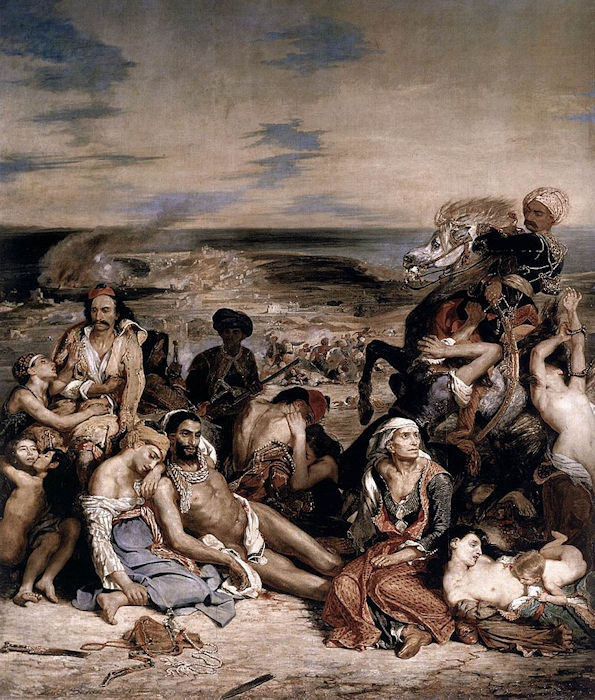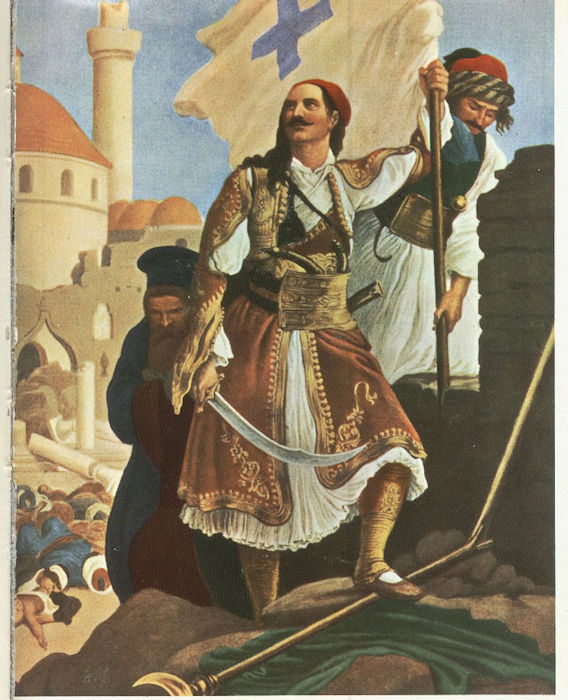Horrible Ancient Massacre On The Island Of Chios Led To Greek Independence
Ellen Lloyd - AncientPages.com - In April 1822, a horrible massacre took place on the Greek island of Chios. The awful event shocked several European countries and forced ancient superpowers to help Greece become independent.
During the Greek War of Independence, also known as the Greek Revolution, against the Ottoman Empire, 120,000 inhabitants of the island of Chios suffered tremendous brutality. They were killed, forced to flee, or sold as slaves. Only 900 inhabitants survived the Turkish massacre.
The island of Chios was part of the Ottoman Empire since about 1450. Living conditions were not only poor, but the Greeks were constantly humiliated by the Turks. Greek rebellions were quickly and forcefully terminated; many people had little hope they would ever become free from the Turks.
Portrait of sultan Mahmud II, given by Mustafa Resid Pasha to king Louis-Philippe of France, now at the Musée de Versailles. Credit: Public Domain
The most frightening event in the history of Chios occurred in 1822 when the Turkish Sultan Mahmud II (1785-1839) gave the order to kill all men over 12, all women over 40, and all children younger than 2 years.
Thousands of Turkish soldiers brutally killed men, raped women, and slaughtered babies with their swords.
Domestic animals were killed, houses were set on fire, and churches plundered. Inhabitants of the island of Chios paid the highest possible price for the Greeks’ rebellion against the Turks.
Soldiers of the Ottman Empire had no mercy when they massacred people on the island of Chios. The Massacre at Chios by Eugène Delacroix. Louvre, Paris. Credit: Public Domain
The Greeks fought bravely for their independence and gained control over vital cities like Corinth, Athen, and Thebes. Commercial ships were rebuilt into warships. All that was necessary to fight against the Turks was done. But the small island of Chios was doomed. It was located just outside the Turkish coast, and Greek rebellions could never arrive on time to save the island’s inhabitants.
Ironically, Chios’ inhabitants never wanted to participate in the Greek rebellion. People on the island asked several times to be left out outside the conflict. In fact, they even preferred to obey the Turkish Sultan than risk living in insecurity. To the Greeks, Chios showed cowardness.
One month before the devastating massacre, a fleet of 4,000 Greek soldiers arrived on the island of Chios. They managed to convince a few of the local farmers to join them in their rebellion, but most inhabitants were frightened and locked themselves in their homes. The Greek rebellions launched an attack against the fortress of Chios, but the Turks quickly terminated their military advances. When the rebellions realized there stood no chance against the Turks, they plundered local houses, stealing jewelry, expensive clothes, and anything of value before leaving Chios to return to Samos.
Chios had 120,000 inhabitants. Only 900 survived the Turkish massacre. Anavatos abandoned village. Credit: Heidi Broome-Raines - CC BY-SA 4.0
When news of the events reached, the Turkish Sultan Mahmud II hell broke out. The Sultan felt betrayed by the Greeks on Chios even if only one thousand people had participated in the rebellion and ordered the island's destruction.
For three months, the Turks killed people on Chios. About 52,000 people were taken as slaves, 25,000 were killed, 15,000 died of their wounds or committed suicide, and 23,000 managed to escape in small boats. Only 1,800 people managed to survive the massacre by hiding, but half of them died of hunger and illness.
The Danish consul of Chios helped people to escape but was later killed by the Turks who caught him. The English consul, on either hand, asked to be paid so he could arrange a safe escape route. It was a big lie. Instead of helping, he betrayed people and handed them over to the Turks.
In June 1822, Chios was nothing but ruins. The Greeks responded by destroying the flagship of Ali Pasha which carried 2,286 people. Most of them were Turkish soldiers and sailors, but many Chios women and children had been taken as prisoners.
Not long after the Chios massacre, the Turkish Sultan realized he had committed a mistake and lost the valuable financial asset the island had provided him.
He offered people who had fled the island to return to Chios, but few did so.
"Commander Kephalas plants the flag of Liberty upon the walls of Tripolizza" (Siege of Tripolitsa) by Peter von Hess. Credit: Public Domain
Many European countries felt sorry for Greece and wanted to support the Greek War of Independence, but England and France were reluctant as they feared a weak Ottoman Empire would tempt Russia to take control over the country and get access to the Mediterranean Sea.
In 1827, the Christian superpowers agreed to send a fleet to Greece, surprising the Turks. At the Peloponnese, a large peninsula linked to the northern territory of Greece by the Isthmus of Corinth 50 out of 70 Turkish ships were destroyed. The Turkish fleet never recovered from this defeat. Next year, the Ottoman Empire was forced to sign a new state that would be created along the line extending from south of Volos to south of Árta. Prince Otto of Bavaria accepted the crown, and the Turkish Sultan recognized Greek independence. This was the Treaty of Constantinople in July 1832.
Updated on March 26, 2024
Written by - Ellen Lloyd – AncientPages.com
Copyright © AncientPages.com All rights reserved. This material may not be published, broadcast, rewritten or redistributed in whole or part without the express written permission of AncientPages.com
Expand for referencesReferences:
Expand for referencesHelen Long - Greek Fire: The Massacres of Chios
John Boardman - Chios: A Conference at the Homereion in Chios, 1984
More From Ancient Pages
-
 Hollow Bones That Let Dinosaurs Become Giants Evolved At Least Three Times Independently
News | Apr 11, 2023
Hollow Bones That Let Dinosaurs Become Giants Evolved At Least Three Times Independently
News | Apr 11, 2023 -
 Nicholas Roerich’s Search For Shambhala And Wish To Fulfill The Mysterious Buddhist Prophecy
Ancient Mysteries | Nov 4, 2016
Nicholas Roerich’s Search For Shambhala And Wish To Fulfill The Mysterious Buddhist Prophecy
Ancient Mysteries | Nov 4, 2016 -
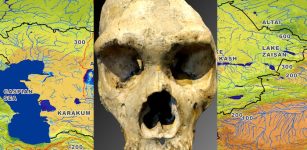 Central Asia Identified As A Key Region For Human Ancestors
Archaeology | Oct 22, 2022
Central Asia Identified As A Key Region For Human Ancestors
Archaeology | Oct 22, 2022 -
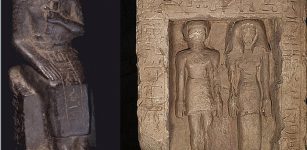 Excavation At Tell Edfu Reveals Early New Kingdom Complex
Archaeology | Jan 10, 2019
Excavation At Tell Edfu Reveals Early New Kingdom Complex
Archaeology | Jan 10, 2019 -
 Strange And Unexplained Events In Transylvania – One Of The Most Mysterious Places In Europe
Featured Stories | Jan 6, 2022
Strange And Unexplained Events In Transylvania – One Of The Most Mysterious Places In Europe
Featured Stories | Jan 6, 2022 -
 Ingenious Paleolithic 3D Map Was Discovered In The Ségognole 3 Cave South Of Paris, France
Archaeology | Jan 15, 2025
Ingenious Paleolithic 3D Map Was Discovered In The Ségognole 3 Cave South Of Paris, France
Archaeology | Jan 15, 2025 -
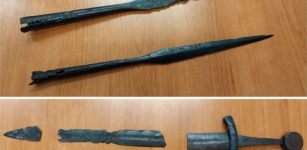 Swords And Spears Of The Yotvingians – A Long-Forgotten Ancient Warrior Culture Discovered In Poland
Archaeology | Jan 6, 2020
Swords And Spears Of The Yotvingians – A Long-Forgotten Ancient Warrior Culture Discovered In Poland
Archaeology | Jan 6, 2020 -
 The Legend Of Little Deer—Interesting Cherokee Tale Of How Disease And Medicine Began, And Why The Native Americans Respect All Life
Featured Stories | May 10, 2017
The Legend Of Little Deer—Interesting Cherokee Tale Of How Disease And Medicine Began, And Why The Native Americans Respect All Life
Featured Stories | May 10, 2017 -
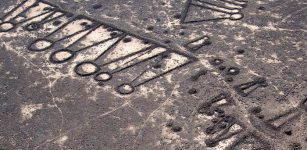 Ancient Highways Unearthed In Arabia
Archaeology | Jan 14, 2022
Ancient Highways Unearthed In Arabia
Archaeology | Jan 14, 2022 -
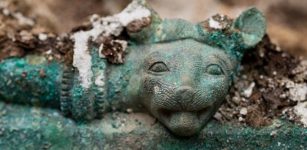 Tomb Of Celtic Prince Has Been Unearthed In France
Archaeology | Mar 5, 2015
Tomb Of Celtic Prince Has Been Unearthed In France
Archaeology | Mar 5, 2015 -
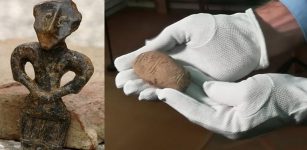 7,000-Year-Old Inscription With Undeciphered Vinca Script – One Of The World’s Earliest Writing Systems Discovered
Archaeology | Feb 17, 2018
7,000-Year-Old Inscription With Undeciphered Vinca Script – One Of The World’s Earliest Writing Systems Discovered
Archaeology | Feb 17, 2018 -
 Rare Stories Of Merlin And King Arthur Discovered In Medieval Manuscript Hidden In Plain Sight
Linguistic Discoveries | Apr 15, 2025
Rare Stories Of Merlin And King Arthur Discovered In Medieval Manuscript Hidden In Plain Sight
Linguistic Discoveries | Apr 15, 2025 -
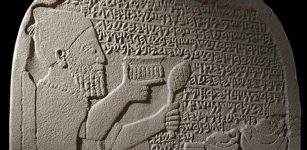 Ancient Kuttamuwa Stele And Iron Age Belief That Soul Lived In Funerary Slab
Featured Stories | Sep 10, 2016
Ancient Kuttamuwa Stele And Iron Age Belief That Soul Lived In Funerary Slab
Featured Stories | Sep 10, 2016 -
 LIDAR Discovers Mysterious Maya Underground Chamber In The Rainforest
Archaeology | Jul 22, 2024
LIDAR Discovers Mysterious Maya Underground Chamber In The Rainforest
Archaeology | Jul 22, 2024 -
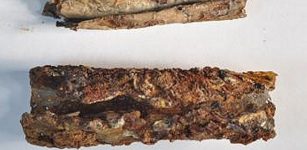 CT Scanning And 3D-Modelling Used To ‘Unfold’ Ancient Silver Plate Found In Jerash
Archaeology | Dec 26, 2015
CT Scanning And 3D-Modelling Used To ‘Unfold’ Ancient Silver Plate Found In Jerash
Archaeology | Dec 26, 2015 -
 The Curse Fell On King Midas And His Gold Desire Became A Nightmare
Featured Stories | Feb 6, 2025
The Curse Fell On King Midas And His Gold Desire Became A Nightmare
Featured Stories | Feb 6, 2025 -
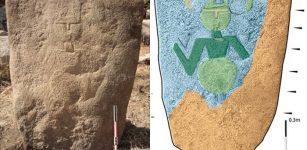 Unique Balchiria Stelae Engraved With A Goat-Like Figure Found On Corsica Is A Puzzle
Featured Stories | Feb 3, 2020
Unique Balchiria Stelae Engraved With A Goat-Like Figure Found On Corsica Is A Puzzle
Featured Stories | Feb 3, 2020 -
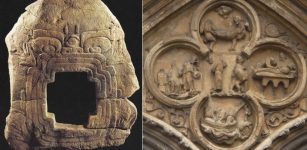 Quatrefoil Symbol Was Used By The Olmecs And Maya Long Before It Appeared On Christians Churches
Ancient Symbols | Mar 19, 2018
Quatrefoil Symbol Was Used By The Olmecs And Maya Long Before It Appeared On Christians Churches
Ancient Symbols | Mar 19, 2018 -
 Norse Religion Was Different Than Previously Thought – New Study Reveals
Archaeology | Feb 27, 2021
Norse Religion Was Different Than Previously Thought – New Study Reveals
Archaeology | Feb 27, 2021 -
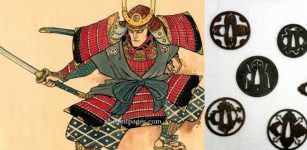 Many Samurai Had Swords With Secret Crucifixes And Hidden Christian Symbols To Avoid Persecution
Ancient History Facts | Jan 10, 2017
Many Samurai Had Swords With Secret Crucifixes And Hidden Christian Symbols To Avoid Persecution
Ancient History Facts | Jan 10, 2017


